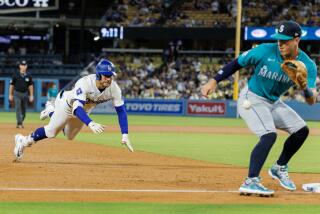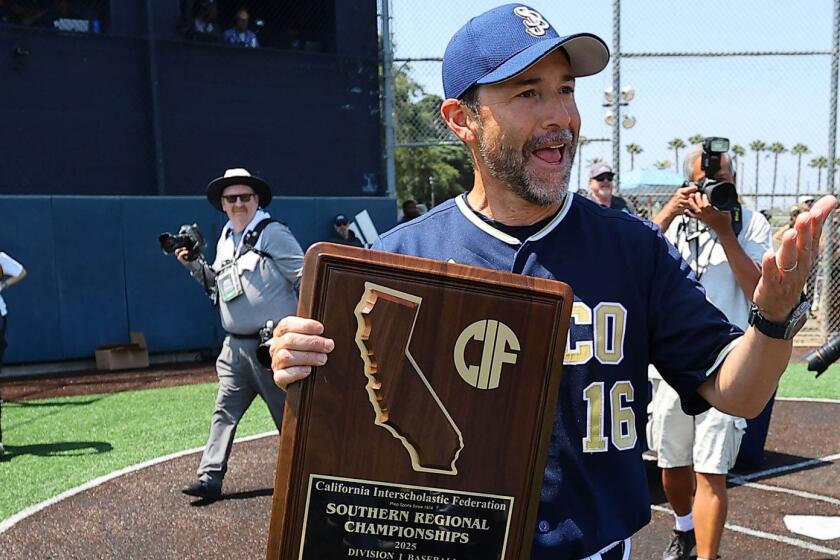BASEBALL / ROSS NEWHAN : After Parting, Shots Are Fired at Lefebvre
- Share via
It was the cheapest of shots, but it still stung.
Here he is in late March, attempting to put the finishing touches on the Chicago Cubs, hoping to instill this veteran team with some of the same self-confidence he gave the youthful Mariners, and Jim Lefebvre still reads complaints from his former Seattle right fielder, Jay Buhner.
Quoted again in USA Today this week, Buhner implied that the Mariners didn’t know their roles under Lefebvre, “didn’t know where they stood,” and said things would be better with new Manager Bill Plummer.
This is the same Jay Buhner whose normal role in his first two full years with the Mariners was on the disabled list.
A variety of injuries reduced his playing time to 58 games in 1989 and 51 in 1990. Lefebvre stayed with him, worked with him and Buhner ultimately fulfilled the promise that the New York Yankees, before the Mariners, gave up on, hitting 27 home runs last season.
Lefebvre bristled the other morning in Palm Springs when he said: “I’ve found over the course of my career that the guys who spout off are usually the guys who can’t handle pressure and try to pass it off on someone else. Everybody in Seattle knew their roles. They were part of a team. That was their role, but that doesn’t mean they were given a job.”
Buhner, he said, would come out of the lineup when he fell into a strikeout rut. But Lefebvre added: “He played more than 135 games as the right fielder last year. There’s no way he didn’t know what his role was or where he stood. That’s the most overused line in baseball, and it almost always comes from a guy who can’t handle the pressure.”
In the aftermath of what seemed to be an inexplicable firing, there have been other complaints. Mike Schooler, the Seattle relief ace when physically sound, said Lefebvre was so obsessed with the team’s first .500 finish that he took players out of roles, broke promises of playing time and stopped communicating with players doing poorly.
It’s all part of a fire trail of spring sparks from his former players, suggesting doubt among the “Lefebvre Believers” of his first spring with the Mariners.
“Amazing,” Lefebvre said. “I was too focused on winning, according to Schooler. How can anyone be too focused on winning? My job is to instill a winning attitude, not to make people happy or to make them like me.
“I helped take a 15-year monkey (of never finishing at .500 or better) off that team’s back. I did what I said I’d do. We took a young club and made it better in each of the three years. We turned the program around, and we turned on a city.”
The Mariners drew a club-record 2.1 million in a market never properly tapped. If the team stays in the Kingdome, as seems likely under new and restructured ownership that will reduce Japanese involvement to less than 50%--on paper, at least--a total attendance of 3 million is possible, Lefebvre said.
He added: “Three years ago, I would have felt that I was ready to manage the Chicago Cubs, but I wasn’t. I learned how to handle myself and my players in Seattle. I learned to delegate authority.
“That’s why I’ll never say anything negative about the organization. I’m very appreciative of the opportunity and experience I received there, but I also feel like I did the job I was hired to do. They’re on the verge of being a legitimate contender.”
The Mariners had an 83-79 record last season, after which Lefebvre was fired for reasons explained only as philosophical differences by both sides.
An underfinanced front office that did little to improve the roster during Lefebvre’s three seasons is known to have undermined his status last year by blatantly sending copies of stories from Seattle newspapers, which suggested there was player unrest, to national baseball writers. It was also management’s feeling that Lefebvre had been openly critical of its failure to supply the right-handed power hitter he desperately needed. Lefebvre said he never did anything more than echo what the front office was saying about the frustrating inability to complete a trade.
The irony of his October firing and Seattle’s subsequent acquisition of a right-handed power hitter in Kevin Mitchell is not lost on Lefebvre, but he is trying not to look back.
In this first spring of a three-year Chicago contract, he is trying to provide what he calls a winner’s vision, a winner’s attention to detail.
“I want them to realize how close they are (to being a championship team),” Lefebvre said.
The resources of the parent Chicago Tribune Co. can improve anyone’s vision. Ryne Sandberg and Mike Morgan are the most recent examples. Lefebvre can go about it differently that he had to in Seattle with a team that also includes Andre Dawson, George Bell, Shawon Dunston and Mark Grace.
He doesn’t require the daily motivational messages delivered in his first spring with the Mariners. Rather, he needs an improved on-base percentage by leadoff man Jerome Walton; consistency that will allow him to retain Gary Scott, last year’s rookie failure, at third base; depth to operate a committee of bullpen closers and a fourth and fifth starter to go with Morgan, Greg Maddux and Danny Jackson.
Don Zimmer and Jim Essian failed to survive as Cub managers last season, when injuries to Mike Harkey, Rick Sutcliffe and free-agent acquisitions Jackson and Dave Smith racked the pitching staff.
The key now is finding those fourth and fifth starters. Lefebvre said he is confident they will come from a group of “healthy and young arms” belonging to Shawn Boskie, Frank Castillo, Lance Dickson and Jim Bullinger, who were a combined 10-18 with the Cubs last season. He also said: “I think we have enough arms to win.”
The dismantling of the Pittsburgh Pirates would seem to have left the New York Mets as the team to beat in the National League East, but with the Mets burdened by external distractions, it is expected to be a competitive division.
“I don’t want to get into another club’s business, but when you lose a 20-game winner (in John Smiley) and a guy who drives in (more than) 100 runs (in Bobby Bonilla), it’s got to leave holes,” Lefebvre said of the defending champion Pirates.
He smiled. “This job is a special one,” the former Dodger infielder said. “Great city, great ballpark and great fans. I’m in hog heaven.”
Reflections: Alvin Davis, the former Seattle first baseman and designated hitter now with the Angels, expressed no bitterness about his changing role under Lefebvre.
Davis, who lost his first-base job when the Mariners signed free agent Pete O’Brien, wrestled with the adjustment to designated hitter and was in and out of the lineup last season when his batting average plummeted to a career-low .221 and his home run total fell to a career-low 12.
“I played if I was hot or if it was a good (hitter-pitcher) matchup,” Davis said. “I didn’t play if I wasn’t hot or if it wasn’t a good matchup. Jim was up-front with me about it. He told me that was the way it was going to be.
“He was in the last year of his contract and felt he had to win. I’d gone through it with other managers there and understood. If I had been in his position, I might have done the same thing.”
Davis said he refused to blame his diminished production on the loss of a regular role, but it disturbed him in the context of loyalty and track record. It was as if his previous production and contributions stood for nothing, but he also realized that the entire organization was under financial stress.
“They couldn’t make the deal for the hitter they needed because they couldn’t afford him,” Davis said. “Jim was frustrated by that, and I think that’s the context in which Buhner is speaking. He felt that instead of complaining about what he couldn’t have, Jim should have seen if the guys on his bench could have given him what he needed.
“People don’t realize how everything about last year was affected by the financial situation--how many uniforms we had, how many caps we could give away. It was life-and-death how many balls we used in batting practice. It was bad. It was sad. It wasn’t major league.”
Ballot box: The major league ownership committee will meet at an undisclosed site during the first week of the season to consider the restructured offer for the Mariners.
The committee’s expected approval then will be forwarded to the full ownership for a vote.
Jeff Smulyan could be out as Seattle’s owner by the end of April, and there is suddenly talk in Seattle of building a 45,000-seat, open-air baseball stadium next to the Kingdome. Nintendo might call it recession-bashing.
More to Read
Go beyond the scoreboard
Get the latest on L.A.'s teams in the daily Sports Report newsletter.
You may occasionally receive promotional content from the Los Angeles Times.










